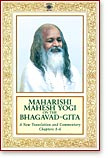| Free Jyotish Newsletter |
 Jyotish.ws
Jyotish.wsMaharishi Mahesh Yogi on the Bhagavad-Gita: A New Translation and Summary, Chapters 1-6 by Maharishi Mahesh Yogi
 Review and Commentary by Michael Laughrin
Review and Commentary by Michael Laughrin
In my opinion, if you want to capture the essence of Maharishi's teachings, read this book 10 times. We know that the Bhagavad-Gita has had more different translations into English than any other book, even the Bible. However, to me, this is different. Maharishi gives the whole meaning of the Vedic teaching in this volume. To me, the two most important sentences of the Gita are:
- Yoga stah, kuru karmani. Established in Being, perform action. (Chapter 2, verse 48)
- Nistraigunyo, bhava, Arjun. Be without the three gunas, Arjuna. (Chapter 2, verse 45)
How can one be established in Being? Through Transcendental Meditation, Maharishi says. The three gunas--sattwa, rajas, and tamas--represent the whole field of relative, changing life. Sattwa is purity, rajas is action, and tamas is dullness. The exact translation from the Sanskrit is somewhat difficult, but that is more or less correct. To be without the three gunas, one must transcend this life of Change and be established in the Eternal life of Brahman. How does one accomplish this? After many, many, many meditations, the mind, having dipped into the transcendental level of existence so often that it has become filled, so to speak, with that transcendence. Then the Absolute, non-changing level of life "sticks" to the mind such that it then never goes away. This we call moksha, or "Enlightenment."
Then, the real life of a human being can begin. Then, one is living one's full potential.
Chapter 3, verse 35 - "Because one can perform it, one's own dharma, (though) lesser in merit, is better than the dharma of another." In essence, this says, "Do your own thing; be yourself." Except, in this case, the highest dharma for all of us is the Universal Dharma of Enlightenment.
Chapter 3, verse 8 - "Do your allotted duty. Action is indeed superior to inaction." One must act, trying to escape the world is impossible, except through oneness with the Absolute.
The Bhagavad-Gita (it means the "Song of the Lord"), to me, answers all the big questions in life:
Then, the real life of a human being can begin. Then, one is living one's full potential.
Chapter 3, verse 35 - "Because one can perform it, one's own dharma, (though) lesser in merit, is better than the dharma of another." In essence, this says, "Do your own thing; be yourself." Except, in this case, the highest dharma for all of us is the Universal Dharma of Enlightenment.
Chapter 3, verse 8 - "Do your allotted duty. Action is indeed superior to inaction." One must act, trying to escape the world is impossible, except through oneness with the Absolute.
The Bhagavad-Gita (it means the "Song of the Lord"), to me, answers all the big questions in life:
- Why are we here? To expand the field of happiness, to gain Enlightenment.
- How should I act? Do your duty.
- How should I think? In an enlightened mind, one neither unduly likes or dislikes anything.
- How can I attain ultimate and permanent happiness? Through yagya. The highest yagya is meditation.
- What happens to the soul after death? For an ordinary person, the soul takes a new body in the same way that a man puts on a new suit. For the Enlightened, he/she has already merged with the Absolute before death and, therefore, he neither goes anywhere (he has realized his Oneness with the Universal Mind), nor need he take on a new body.
- What is the enemy? Anger.
Chapter 2, verse 40 - "In this (Yoga) no effort is lost and no obstacle exists. Even a little of this dharma delivers from great fear."
Chapter 6, verse 32 - "He who sees everything with an even vision by comparison with the Self, be it pleasure or pain, he is deemed the highest yogi, O Arjuna."
Chapter 6, verse 30 - "He who sees Me everywhere, and sees everything in Me, I am not lost to him nor is he lost to Me."
Chapter 6, verse 17 - "For him who is moderate in food and recreation, moderate in effort in actions, moderate in sleep and waking, for him is the Yoga which destroys sorrow."
Chapter 5, verse 18 - "In a Brahmin endowed with learning and humility, in a cow, in an elephant, in a dog and even in one who has lost his caste, the enlightened perceive the same."
Indian philosophy says that desire is bad and that one should try to be without desires. Maharishi says that desires are good, they must be fulfilled, because, ultimately one will have the desire to attain eternal happiness--enlightenment. Then, and only then, will one effortlessly live in a desireless state. Trying to fake it before perfect Union with the Absolute will only cause strain and unhappiness.
Chapter 6, verse 32 - "He who sees everything with an even vision by comparison with the Self, be it pleasure or pain, he is deemed the highest yogi, O Arjuna."
Chapter 6, verse 30 - "He who sees Me everywhere, and sees everything in Me, I am not lost to him nor is he lost to Me."
Chapter 6, verse 17 - "For him who is moderate in food and recreation, moderate in effort in actions, moderate in sleep and waking, for him is the Yoga which destroys sorrow."
Chapter 5, verse 18 - "In a Brahmin endowed with learning and humility, in a cow, in an elephant, in a dog and even in one who has lost his caste, the enlightened perceive the same."
Indian philosophy says that desire is bad and that one should try to be without desires. Maharishi says that desires are good, they must be fulfilled, because, ultimately one will have the desire to attain eternal happiness--enlightenment. Then, and only then, will one effortlessly live in a desireless state. Trying to fake it before perfect Union with the Absolute will only cause strain and unhappiness.
Truly there is in this world nothing so purifying as knowledge; he who is perfected in Yoga, of himself in time finds this within himself."
Chapter 4, verse 20 - "Having cast off attachment to the fruit of action, ever contented, depending on nothing, even though fully engaged in action he does not act at all."
Chapter 3, verses 29 through 31 - "Let not him who knows the whole disturb the ignorant who know only the part.
Surrendering all actions to Me by maintaining your consciousness in the Self, freed from longing and the sense of 'mine,' fight, delivered from the fever of delusion.
Those men who are possessed of faith, who do not find fault and always follow this teaching of Mine, they too are liberated from action."
The words of Lord Krishna are so delightful and so self-explanatory that I have used many quotes directly from the Gita.
Read the book. I consider it the best book ever printed (along with the Bible).
Review (c) copyright 2008 Michael Laughrin.
From the Feburary/March 2008 issue of Michael Laughrin's North American Jyotish Newsletter. Click to subscribe to this free Jyotish newsletter.
Read more articles by Michael Laughrin.